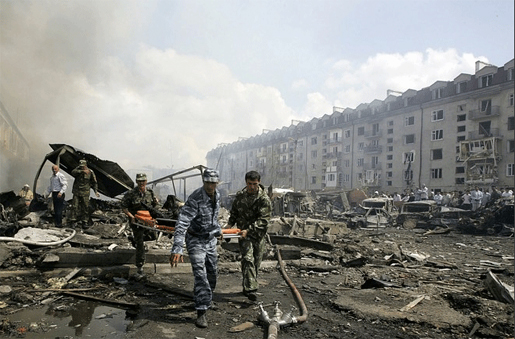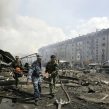
Another Lost Year for the Kremlin in the North Caucasus: 2010 in Review (Part Two)
Publication: Eurasia Daily Monitor Volume: 8 Issue: 9
By:

In 2010, rights activists in the North Caucasus continued to come under strong pressure from the Russian government. Most notoriously, in September 2010, Chechnya’s ruler Ramzan Kadyrov filed a libel case against head of the Memorial human rights center, Oleg Orlov. Following the killing of the renowned Chechen rights activist Natalya Estemirova on July 15, 2009, Orlov stated that Kadyrov was responsible for what happened (www.kavkaz-uzel.ru, January 12, 2011). Attempts to prosecute the head of Memorial, of which Estemirova was a member, overshadowed the fact that her murder was not properly investigated and has yet to be brought to a court hearing.
A fearless human rights activist, Natalya Estemirova was abducted in Grozny and hours later found dead in neighboring Ingushetia. Several days before her murder, Kadyrov’s close associate Adam Delimkhanov, in a TV interview in Chechen, threatened rights activists, equating them with Chechen insurgents. One year later, on July 3, 2010 Kadyrov was still referring rights activists and the Memorial organization as “enemies of the people,” using the Stalin-era term for dissidents and anyone who challenged the regime (www.kavkaz-uzel.ru, July 9, 2010).
Celebrated for her brave reporting on Chechnya, the Russian journalist Anna Politkovskaya was murdered in Moscow on October 7, 2006. Vladimir Putin, who was then Russia’s president, famously declared after Politkovskaya’s killing that “her death harmed Russia more than her reporting did.” Putin’s and Kadyrov’s statements about the rights activists strikingly mirrored each other, and it is also well-known that Estemirova and Politkovskaya often cooperated quite closely. Several people, including two former security services agents, were brought to trial in Politkovskaya’s case, but on February 19, 2009, the jury acquitted all of them and the investigation has stalled ever since (Interfax, February 19, 2009).
When the Kremlin picked Aleksandr Khloponin to lead the North Caucasus, many analysts praised Moscow’s choice of an economically savvy manager without prejudices, discerning “a thaw” or an attempt at policy liberalization. Indeed, Khloponin initially concentrated on coming up with an economic revival plan for the North Caucasus and made few statements about security issues. However, even Khloponin did not evade making ritual witch-hunt-style remarks typical of Russian officials. During a TV press conference on October 26, 2010, he accused Western security services and “provocateurs” of meddling in North Caucasus affairs and stirring up tensions in the region in the run up to the Sochi Olympics in 2014 (RIA Novosti, October 26, 2010). Khloponin did not bother to provide proof of his accusations and preferred to forget that the situation in the North Caucasus was less than perfect prior to 2007, when the International Olympic Committee awarded the 2014 Winter Olympics to Sochi.
As Khloponin’s mission unfolded in the North Caucasus, it became increasingly evident either that he was not capable of boosting economic development in the region or this was not his actual task. In a revealing dialogue with Prime Minister Putin and other government officials, Khloponin emphasized the need to concentrate regional management of the North Caucasus in his hands through building a regional “vertical of power” (www.premier.gov.ru, December 1, 2010). The strategy for the socio-economic development of the North Caucasus that was officially inaugurated on September 6, 2010 stipulated few realistic, achievable goals.
Khloponin’s grandiose project, worth $15 billion, to build five ski resorts in five republics of the North Caucasus was extensively advertised in the summer 2010, but then gradually replaced with much smaller scale projects of local importance. The tourism potential of the North Caucasus was given much consideration in the strategy, which virtually overlooked the enormous instability in the region. Among the striking things about the strategy was the total absence of joint projects that would require the participation of two or more republics from the North Caucasus (www.government.ru, September 6, 2010). Apparently Moscow is either concerned about getting the North Caucasian republics too close to each other or is not overly interested in their actual development, preferring to keep them subsidized.
In 2010 Moscow experienced some natural constraints on its ability to subsidize the North Caucasus budgets because of the ongoing difficulties in the Russian economy and reallocating resources. All the republics of the North Caucasus with the exception of Ingushetia experienced moderate to significant cuts in the financial aid provided by Moscow. Ingushetia had a slight increase in its 2010 budget — by $16 million in comparison to 2009. However, Chechnya’s budget for 2010 suffered the greatest loss, shedding a hefty $500 million, or 20 percent reduction from 2009. It is worth pointing out that in 2009, the budgets of the North Caucasian republics actually grew in comparison to 2008. So 2010 became the first year in which practically all budgets in the North Caucasus were slashed.
(https://openbudget.karelia.ru/budnord/russian/fo_sevkav.htm, accessed on January 12, 2011)
No exact information exists about how much Moscow spends on the North Caucasus each year, but figures ranging from $6 billion to $8 billion frequently are mentioned. While this figure may not be a crucial sum of money for Moscow, the region-wide reduction of North Caucasus budgets in 2010 may signify that even these relatively small resources have become burdensome for the Kremlin. Moreover, an attempt to reform the North Caucasus in 2010 may have been partly influenced by the government’s inability to provide ever-increasing funds for this unstable border region. The decline in funding coincided with an officially recognized increase in violence in the North Caucasus. Many analysts had repeatedly warned that North Caucasians’ loyalty to Moscow depended on the resources Moscow was able and willing to provide for these territories. 2010 was instructive in this sense, and more challenges may lie ahead in 2011 as the short and mid-term outlook for the Russian economy does not seem bright.




